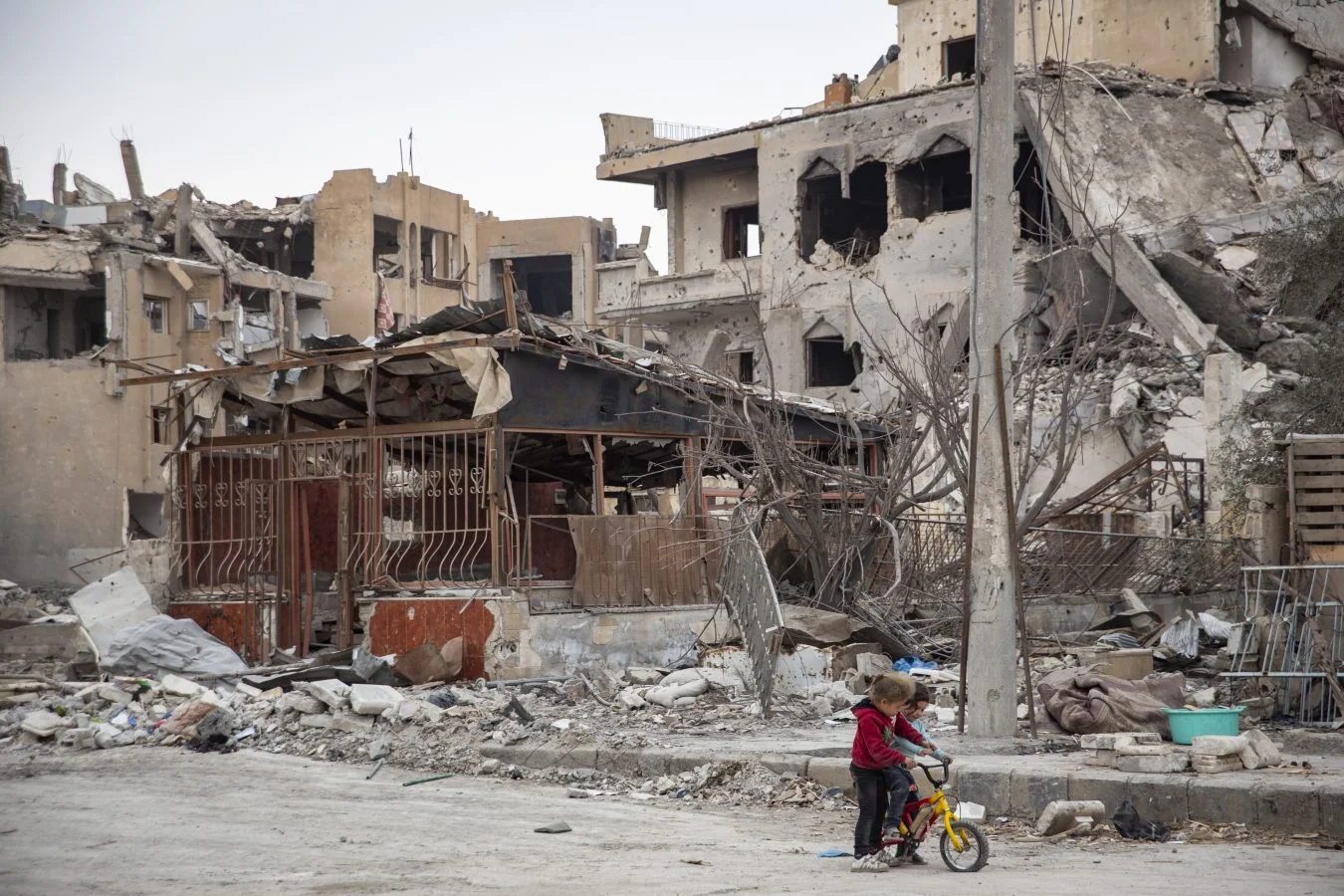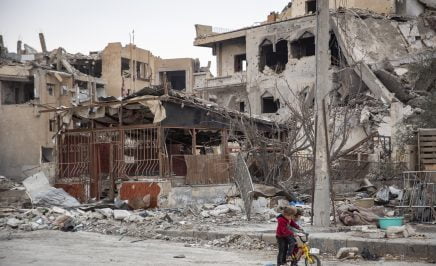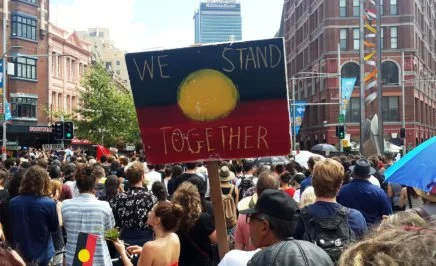- Disappointing Pentagon communiqué spurns liability for civilian casualties
- Coalition strikes destroyed 80% of Raqqa, killing hundreds of civilians
- Ongoing Amnesty International investigation reveals evidence of dozens of new civilian victims
The US-led Coalition’s ongoing failure to admit to, let alone adequately investigate, the shocking scale of civilian deaths and destruction it caused in Raqqa is a slap in the face for survivors trying to rebuild their lives and their city, said Amnesty International a year after the offensive to oust the armed group calling itself Islamic State (IS).
On 17 October 2017, following a fierce four-month battle, the Syrian Democratic Forces (SDF) – the Coalition’s Kurdish-led partners on the ground – announced victory over IS, which had used civilians as human shields and committed other war crimes in besieged Raqqa. Winning the battle came at a terrible price – almost 80% of the city was destroyed and many hundreds of civilians lay dead, the majority killed by the Coalition’s bombardment.
In a letter to Amnesty International on 10 September 2018, the US Department of Defense – whose forces carried out most of the air strikes and all the artillery strikes on Raqqa – made clear it accepts no liability for the civilian casualties it caused. The Coalition does not plan to compensate survivors and relatives of those killed in Raqqa and refuses to provide further information about the circumstances behind strikes that killed and maimed civilians.
“This is an insult to families who – after suffering the brutality of Islamic State rule – lost loved ones to the Coalition’s cataclysmic barrage of firepower” – Kumi Naidoo, Amnesty International’s Secretary General
“Disturbingly, the Pentagon does not even seem willing to offer an apology for the hundreds of civilians killed in its ‘war of annihilation’ on Raqqa. This is an insult to families who – after suffering the brutality of IS rule – lost loved ones to the Coalition’s cataclysmic barrage of firepower,” said Kumi Naidoo, Amnesty International’s new Secretary General, who has just returned from a field visit to Raqqa.
“One year after the battle ended, the obstacles to justice are still insurmountably high for victims and their families. It is completely reprehensible that the Coalition refuses to acknowledge its role in most of the civilian casualties it caused, and abhorrent that even where it has admitted responsibility, it accepts no obligation towards its victims.”
Flawed civilian casualty reporting
The Coalition’s failure to live up to its commitments to carry out ground investigations into the impact of its strikes is one reason why its own civilian casualties count is so implausibly low.
Prior to Amnesty International’s June 2018 report “War of Annihilation: Devastating Toll upon Civilians in Raqqa – Syria”, the Coalition had admitted to causing just 23 civilian deaths in its entire Raqqa campaign. Incredibly, a year after the offensive, the UK Ministry of Defence still maintains its hundreds of air strikes in Raqqa resulted in zero civilian casualties – a statistical improbability.
Following a string of blustery denials from military officials and politicians, at the end of July the Coalition quietly admitted it had caused a further 77 civilian deaths – almost all of those documented in Amnesty International’s report.
Despite its admission of responsibility in these cases – a more than 300% increase on previous reports – the Coalition persists in refusing to detail the circumstances in which these civilians were killed.
“Surely, with hundreds of civilians dead, it begs the question what went wrong. Was it weapon malfunction, poor intelligence, human error, or fundamental negligence? Did the Coalition fail to adequately verify the targets, or was it down to a poor choice of munition?”– Kumi Naidoo, Amnesty International’s Secretary General
“Surely, with hundreds of civilians dead, it begs the question what went wrong. Was it weapon malfunction, poor intelligence, human error, or fundamental negligence? Did the Coalition fail to adequately verify the targets, or was it down to a poor choice of munition? These are crucial details, to establish both facts and assess lawfulness, as well as learn the lessons necessary to avoid similar mistakes in future, which is fundamental to minimising harm to civilians – a legal obligation,” said Kumi Naidoo.
In what it called its “final response” to Amnesty International, the US Department of Defense stated that it does not consider itself bound to answer further questions about the circumstances and reasons behind launching strikes which killed and maimed so many civilians.
Spurious assertions
The Department of Defense also spuriously asserted that experienced Amnesty International researchers, military and legal experts do not understand international humanitarian law (the laws of war). It suggested that Amnesty International based its prima facie case that the law had been broken on the deaths of civilians alone. In doing so, it chose to ignore evidence that, in the cases documented by Amnesty International, IS fighters were not present at the scene of the air strikes that killed and injured civilians – a key part of the analysis: Amnesty International believes this evidence provides a prima facie case that these strikes violated international humanitarian law.
“The crucial question raised by our research is whether the Coalition took the necessary precautions to minimise any potential harm to civilians, as the laws of war require. While the Coalition refuses to provide this information, the evidence shows it did not,” said Kumi Naidoo.
“Protecting civilians is about more than making pledges and using fine words. It requires proactive investigation into civilian casualties, transparency, and a willingness to learn lessons and amend procedures which are failing to minimise the risk of harm to civilians. It also requires acknowledging the full scale of the harm caused to civilians and affording victims the possibility of justice, accountability and reparation.
“Secretary of Defense James Mattis has claimed US forces are ‘the good guys’. ‘The Good guys’ would comply with the laws of war and do whatever is necessary to ensure innocent civilians who suffer as a result of their actions get the justice they deserve.”
New evidence of wider pattern of civilian casualties
In the absence of a meaningful effort so far by Coalition forces to investigate the impact their Raqqa campaign had on civilians, Amnesty International continues to gather further evidence about the wider patterns of civilian casualties in Raqqa. Among other things, this is based on four field investigations in Raqqa so far – the most recent of which was last week – as well as relying on military expertise and comprehensive expert analysis of satellite imagery.
Amnesty International has recently unearthed details of many more previously undocumented cases in which Coalition strikes killed civilians with apparently no IS fighters present in the vicinity at the time. For example, these include 20 civilians from the Merbad and al-Tadfi families in separate air strikes in June and September 2017.
Amnesty International has recently unearthed details of many more previously undocumented cases in which Coalition strikes killed civilians with apparently no IS fighters present in the vicinity at the time.
The organisation has also conducted further investigations into the last of a series of Coalition strikes which killed 39 members of the Badran family and 10 other civilians. The Coalition previously acknowledged responsibility for 44 of these deaths and rejected the remainder as “non-credible”. But new details pin down the exact time and date of the final air strike on 10 September 2017, which killed two members of the Badran family and three other civilians, including a 70-year-old man who was the city’s former attorney general.
Amnesty International will soon release the full details of these and many other newly documented cases – amounting to scores of civilian casualties still unacknowledged by the Coalition.
“While the Coalition continues to bury its head in the sand, we will continue to work on the ground and use all the tools available to us to expose the full extent of civilian casualties and demand justice and full reparation for victims and their families,” said Kumi Naidoo.



